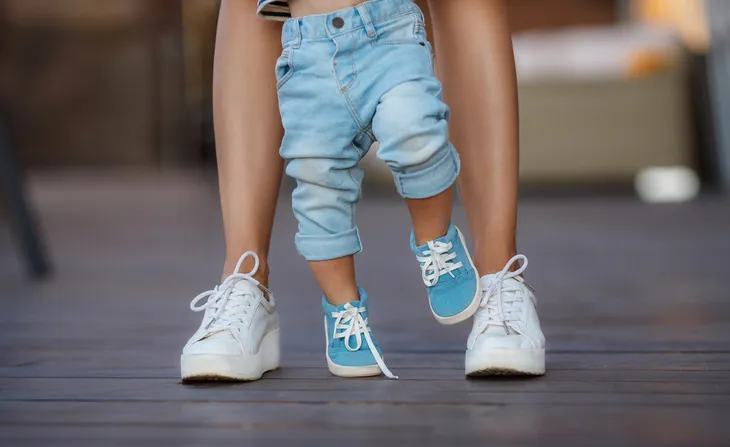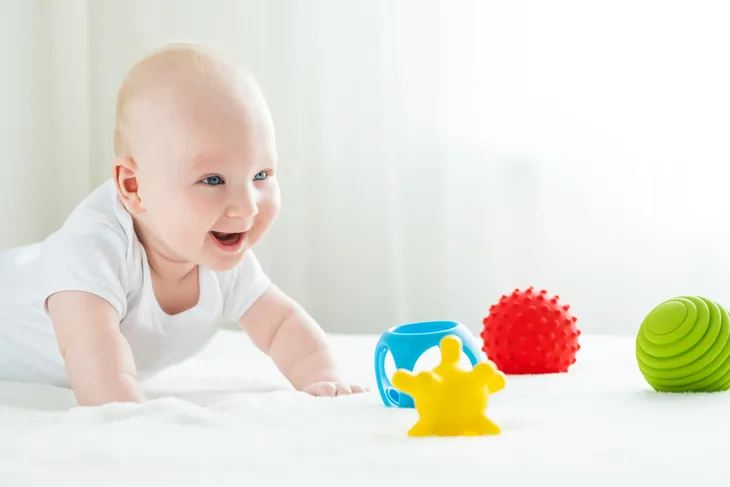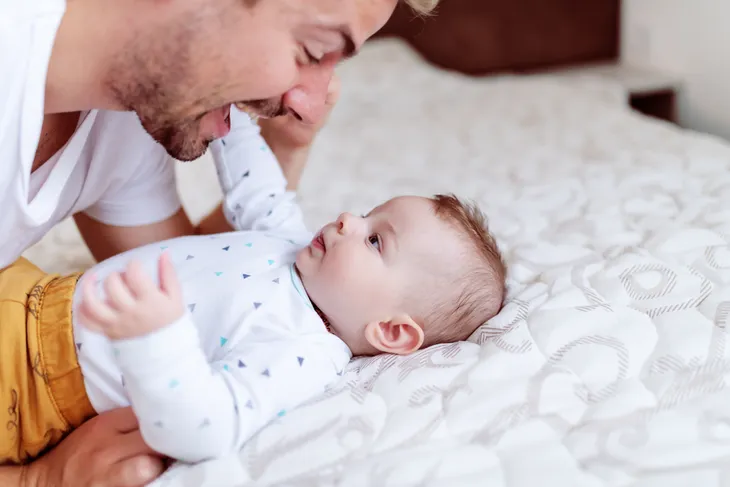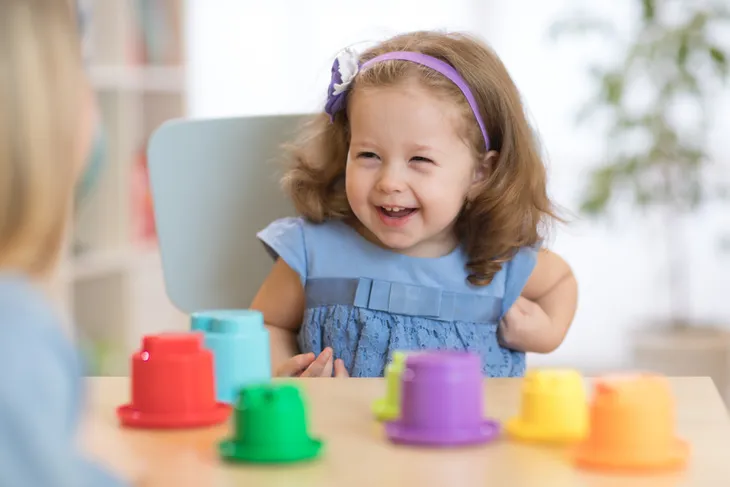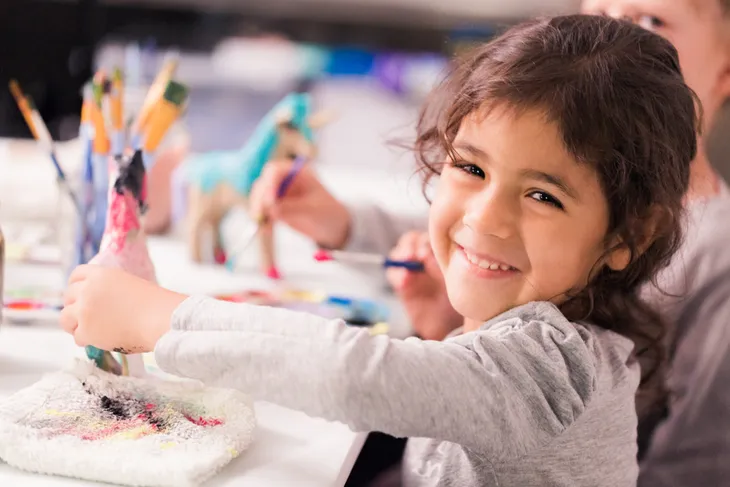Smiling for the first time, taking their first step, and saying their first word are a few of the exciting milestones parents look forward to. But knowing what they should be doing and when can be overwhelming. That’s where we come in! We’ve developed a comprehensive list of child development milestones to help you navigate the key milestones in their early years.
Familiarizing yourself with the upcoming development milestones is critical to spotting troubling development signs early and correcting them. Bookmark this page now because you’ll surely be coming back to it monthly. Unless this is your first child. Then, you’ll likely be coming back hourly! But joking aside, here are the top child development milestones for ages 2-months to 5-years.
What Are Child Development Milestones
Child development milestones are a scientifically verified list of skills that parents can use to cross-reference the development of their little ones.
Keep in mind, no two children are alike, and no parenting experience is either! So, it’s best to think of the following lists of milestone skills, and their corresponding ages, not as a precise roadmap, but more like a compass to guide your hand.
Why Do We Use Them?
Development milestones exist to help parents spot developmental delays. They include potential warning signs of developmental delays alongside the joyous ones like walking and talking.
When your child reaches the developmental milestones at the typical ages, it’s a good indicator that your child is developing as expected. If your child is reaching milestones earlier, they may be advanced compared to their peers. Nonetheless, it’s all important information that can help you monitor your child’s development.
Milestones at 2 Months
At the 2-month mark, babies begin their social life humbly, by starting to smile at people and paying more attention to faces. They’ll also begin attempts to look at their parents, turn towards sounds and make gurgling sounds themselves. Physically, 2-month-old’s can hold their head up, and make smoother movements with their arms and legs.
Signs of a developmental delay involve the inverse of most of the skills we mentioned above. You’ll want to talk to your child’s doctor if you notice that they don’t respond to loud sounds, if they don’t watch things as they move, if they don’t smile at people, if they don’t bring their hands to their mouth or if they can’t hold their head up when pushing up when lying on their belly.
Milestones at 4 Months
By this age, most babies will smile spontaneously. They often begin mimicking movements and facial expressions and enjoy playing much more, even crying when playtime stops. Parents may notice variations in their crying as babies develop different ways to communicate hunger, pain, and fatigue. Physically, 4-month milestones include the ability to hold the head steady, rollover from belly to back, as well as hold and shake toys.
Developmental delays remain consistent with the previous age bracket. You should contact your child’s doctor if, at 4-months, your baby still doesn’t watch things as they move, smile at people, or bring things to their mouth. You should also call them if your baby doesn’t coo or make sounds, if they don’t push down with their legs when their feet are placed on a hard surface, or has trouble moving one or both eyes in all directions.
Milestones at 6 Months
The median 6-month-old will begin distinguishing between strangers and familiar faces. That includes their own, as babies often start staring at their own reflections at the half-year mark. Their verbal skills start to take shape too! You should notice them string vowels together, respond to sounds with sounds of their own, and voice their displeasure.
If the baby has difficulty rolling over, doesn’t laugh, or their muscles seem stiff or floppy, you should consider a check-up. The same can be said for six-month-old infants that show no affection for caregivers, or babies who don’t try to grab things that are out of reach.
Milestones at 9 Months
This age milestone often brings on clinginess, to familiar adults and toys alike. Your 9-month-old may begin to be afraid of strangers too, and may also start to understand the word no. They should enjoy peek-a-boo and be able to watch the path of falling objects, sit without support, and pick up small objects between their thumb and index finger.
Nine-month-old’s share many signs of developmental delays with their younger counterparts. In addition to the ones we’ve already discussed, parents and caregivers should take caution if their child doesn’t bear weight on their legs with support, can’t sit with help, doesn’t respond to their own name, doesn’t look where you point, or won’t play any back-and-forth games.
Milestones at 1 Year
The 1-year milestone is always a cherished one. But a child’s first birthday brings more than presents. There are some significant developmental milestones on the itinerary too, including a child’s first steps. Babies at this age are often shy or nervous with strangers, cry when their parents are away, and can even respond to spoken requests.
A check-up may be warranted if the child doesn’t crawl, point to distant objects, can’t stand when supported, or doesn’t say single words like “dada” or “mama”. A 1-year-old child losing skills that they once possessed may be a sign of a developmental delay too.
Milestones at 2 Years
Yes, your child should be disobeying you. At least that’s what doctors classify as the normal behavior of two-year-old’s. The terrible twos indeed. Developmental benchmarks at this milestone also include increased independence, the ability to point to things when they are named, using 2 to 4-word sentences, the ability to kick a ball, and more.
Talk to your child’s doctor if the child in question doesn’t use 2-word phrases, is unsure how to use common objects like brushes and spoons, or walks unsteadily. The child is expected to be able to copy actions and words, and follow simple instructions by now, so act early and seek support if your child doesn’t.
Milestones at 4 Years
The 4-year milestone can be an exciting one full of exploration, learning, and physical activity. At this age, children can understand some of the basic grammatical rules, tell stories, and sing or recite poems from memory. They often seek out other children at playtime and enjoy doing new things. They can grasp concepts of counting, time, and can name some colors and numbers too.
Some of the signs of delay at this age are more subtle but are easy enough to spot for those knowing what to look for. If your child has trouble scribbling, can’t jump in place, resists getting dressed or sleeping, speaks unclearly, shows no interest in interactive games, or ignores anyone outside the family, consider bringing your child in for a check-up.
Milestones at 5 Years
Finally, we reach the 5-year milestone mark. That’s not to say that parents should cease to watch out for developmental delays, just that, by this point, many of the most common ones will have manifested by now. Socially, five-year-olds seek acceptance with their peers, speak very clearly, can count 10 or more things, and can use a fork and spoon with little effort.
It’s important to consult a doctor if your 5-year-old displays extreme behavior, doesn’t show a wide range of emotions, has difficulty distinguishing between what’s real and what’s make-believe, or is unusually withdrawn.
When to See a Doctor
Children should be screened for general development at 9, 18, and 30-months. They should be screened for autism at 18 and 24 months, too. At least, that’s what the American Academy of Pediatrics recommends.
It may seem trivial, and your children may fuss about it, but spotting developmental delays and acting early can have a dramatic impact on your child’s life moving forward.
A Note on Child Development
These days, parents have access to a wealth of information online. Despite that, it’s incredibly easy to get disoriented by the endless deluge of development charts, advice blogs, and online videos.
If there’s anything that you’re ever unsure about, play it safe and consult your doctor. You’ll want to be sure to stay up to date on health and development checks too.

